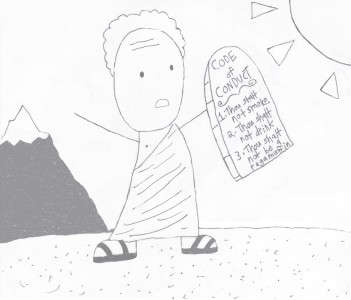Editorial

Numerous students disregard the Code of Conduct; for example, athletes interviewed by Inklings Senior Writer Isaac Stein ’12 repeatedly said that they knew of many kids who had willingly violated the Code.
Certainly we cannot expect that every single student will be caught and punished for their transgressions. For this reason, it’s difficult to blame the school or the athletic department for what some students perceive as the ineffectiveness of the Code. Rather, the fact that the school isn’t omniscient means that a great deal of responsibility falls on the shoulders of the students.
Students should realize that the Code is not just a piece of paper; it is a contract that they enter into. Breaking this contract represents dishonesty on a basic level.
Because of this, students should police themselves. Athletic Director Marty Lisevick has said that the school is more lenient towards students who come forward and admit their mistakes; when the school learns of code violations by way of other students, coaches, or police reports, more severe punishments are likely.
This should be enough to dissuade students from concealing their violations of the Code. The Code is a contract, and the fact that some students violate it does not reduce its importance.
Ultimately, the students who sign the code should do the most to strengthen it. Though the Code and its punishments can be made more severe or unforgiving, its effectiveness largely depends on the degree to which it can be enforced.
Of course, not only students are responsible for the Code’s upkeep. Parents should be aware that when their kids drink, smoke, or otherwise engage in illegal activities, they are not simply breaking the law – they are violating the terms of a contract they have pledged to uphold. Allowing kids to do this only teaches dishonesty.












































